In this interview, we delve into the story of Glenn Morgan, Bill Nation, and Eric Lewald, three college friends whose shared passion for motorcycles ...
How to Navigate the High Seas of Yacht Business Ownership
Written by: Esther Strauss
Esther is a business strategist with over 20 years of experience as an entrepreneur, executive, educator, and management advisor.
Published on April 18, 2024
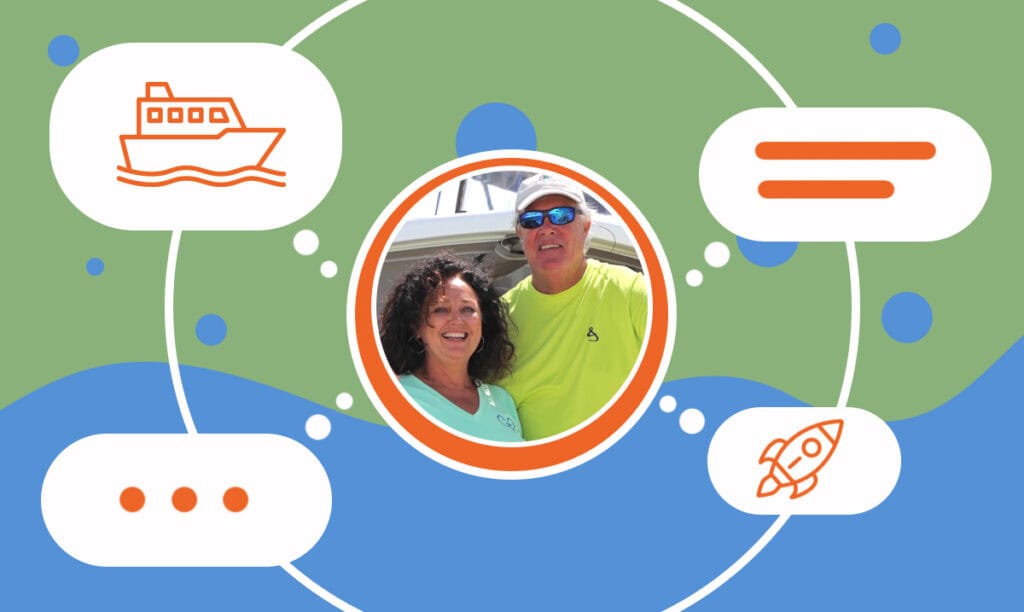
Embark on a voyage through the world of catamaran entrepreneurship with Estelle and Stephen Cockcroft, seasoned veterans boasting three decades of experience in the industry. As the owners of Catamaran Guru, their expertise and passion for sailing have propelled them to the forefront of the yachting world.
In this interview, they share insights into their inspiration, challenges faced, strategies for success, and their perspectives on the evolving landscape of the catamaran business. Join us as we navigate the seas of entrepreneurship with these distinguished captains at the helm.
Setting Sail: The Catamaran Guru Story
SBS – What inspired you to start Catamaran Guru?
Estelle – Stephen and I started sailing in 1992 on our monohull in Cape Town, and we later got into catamarans. The catamarans were very new when we started sailing them, and we soon realized that people were thirsty for knowledge about these boats, so we started the Catamaran Guru website as a helpful tool for other people. We gave some hints on how to sail the boat, what to look out for, etc. Eventually, people came to our website so much that we started selling boats and helping people buy boats or catamarans.
Stephen – We started it as a help site in 2005. Because we got into catamarans early, the site was a community where we could share our accumulated knowledge.
Estelle – We have sailed all over the world and have an intimate knowledge of the entire industry, so it’s easy — or easier — for us to impart that knowledge to other people.
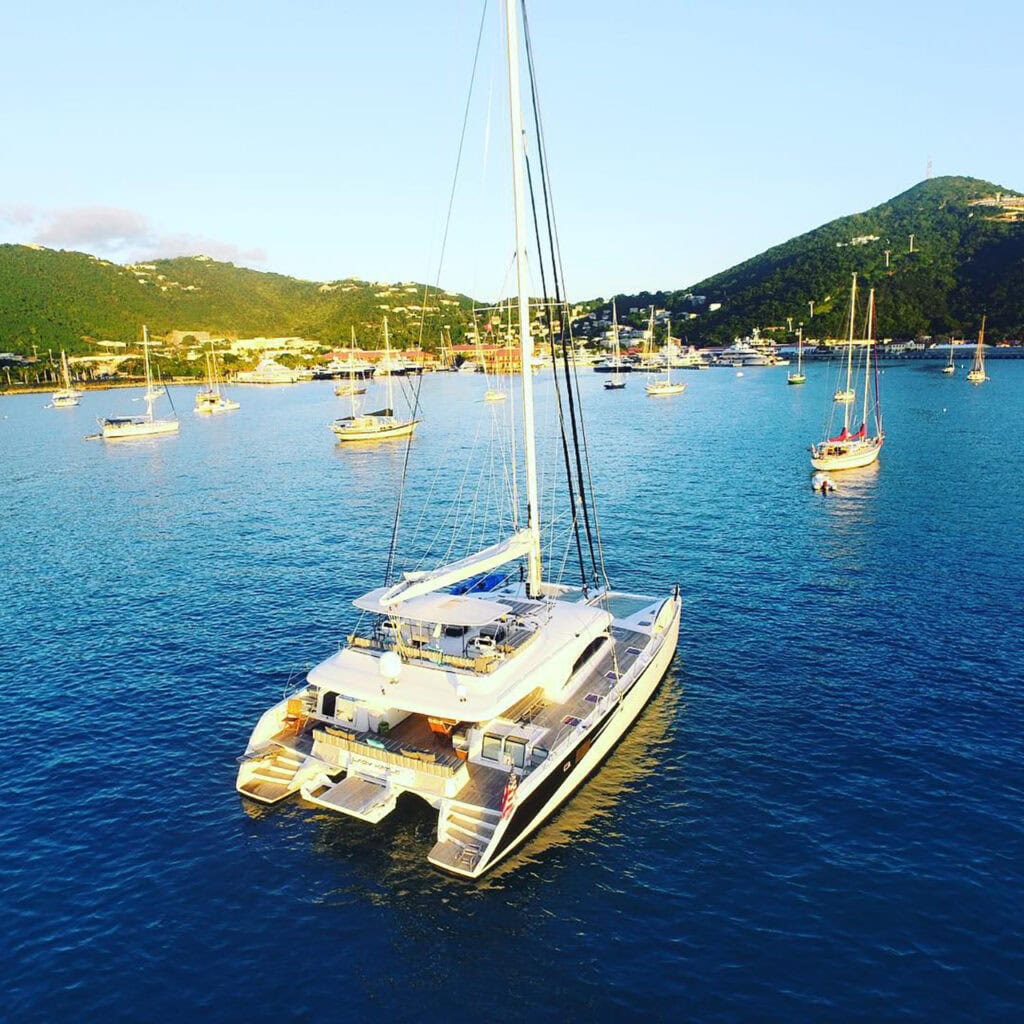
Sailing Ahead: Setting Your Services Apart
SBS – How do you differentiate your services from other yacht sales or charter management companies?
Stephen – We started in the boating industry by building our boat in our backyard in Cape Town, South Africa. We’ve sailed to 45+ countries around the world and have done close to 100,000 miles of offshore bluewater cruising. We’ve also been involved in every single facet of the business. We’ve owned a factory that manufactured catamarans. We’ve owned sailing schools (we own one today). We’ve owned charter companies. We’ve worked with retail. Along the way, we’ve accumulated this knowledge to share with other catamaran owners. We always laugh and say we’ve made every mistake possible, so we hope that we can give good advice.
Anchoring Across Continents
SBS – What made you move from Africa to the US again?
Stephen – We didn’t move. We went sailing. We went sailing for a sabbatical, and we ended up in Kenya. Then we thought we should keep going, so we sailed around the horn of Africa, up the Red Sea, through the Suez Canal, and got into the Mediterranean Sea. Then, we decided to spend some time there, so we did. After that, we went out of Gibraltar, got to the Caribbean, and then got into business — by accident, just selling boats, owning a charter company, owning a sailing school, manufacturing boats. Then, finally, we bought a US company and ended up in the US by accident. There was no final destination for us. We just went where the wind took us.
Estelle – In our travels, we saw the opportunity, and I think taking the opportunity when it’s available is the first step to being a good entrepreneur.
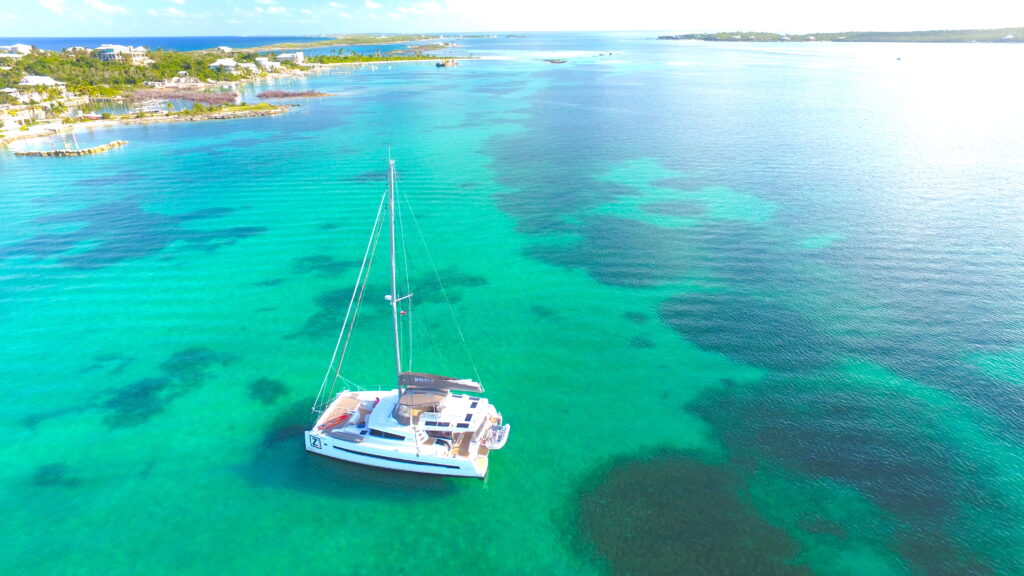
Charting a Course: Key Considerations in Catamaran Advising
SBS – What key factors do you consider when advising a client about buying a catamaran?
Stephen – It depends on a lot of factors: their skill level, whether they want to cruise the Caribbean, for example, or they want to cross oceans, what sort of lifestyle they envisage, etc. There’s no perfect boat, so every boat is a compromise. You look at which boat has the most and the best features for that particular client’s needs. It’s not one boat fits all.
Estelle – When people come to boat shows and say they want to buy a boat, I tell them there are performance boats, cruising boats, day sailors, etc. But more often than not, the couple, or a person, will walk into a boat and say, “Wow, this is my boat!” It’s much like a house. You walk into a house, and you realize it’s going to be your home because it kind of ticks all the boxes for you. Then, we just have to figure out whether or not the client or the buyer has the skill that suits the boat they want to buy.
Weathering Storms
SBS – What challenges come along the way in your line of business?
Estelle – Our own personal boat is in charter management, and we have done the charter ourselves as the crew. We help many people get into business on boats because there are great programs in the US that go along with tax programs. But the challenges are numerous. The rewards are huge. Probably the biggest challenge is that if you manage the boat as a crew, you’re on 24/7. There’s no getting away from the guests. Sometimes you have a difficult guest. I would say it’s fantastic 90% of the time. You have a great time, and the boat performs as it should. However, once in a while, you get a difficult client, the weather is terrible, or something breaks down on the boat, and you have to deal with it and make the best of a bad situation.
Stephen – The charter management business is very difficult. A crew charter (a boat with a hired crew) is better than a bareboat, which is like a rental car. Boats are highly technical equipment; if you get a bareboat, you’re operating in a hostile environment with an inexperienced person. (What could go wrong?) Still, our business seems to work. The charter industry is big and mature today. I think the boats have evolved specifically to suit the charter industry to a large degree because this industry probably buys a lot more boats than the retail market.
Estelle – A lot of clients to whom we sell boats act as crew. Eventually, because you make quite a bit of money renting the boat out, you can pay for your boat pretty quickly. Then, these couples take their boat and sail around the world after their charter program.
Smooth Sailing: Ensuring Customer Satisfaction
SBS – How do you ensure your customer satisfaction is at the best possible level?
Stephen – You can’t keep all the people happy all the time. But if you do your best, you’re honest, and you tell it like it is, without sugarcoating, and give very accurate information so that the customer’s expectation is managed and met, the customer is generally happy and satisfied. A lot of it has to do with information sharing. Of course, we’re in a business where our DNA is community. It’s not yard sales. When someone buys a yacht from us, they become a part of our community. We have ongoing communication and support for our customers, as opposed to a hard-nosed dealership where you buy the boat and say “Goodbye.”
Hoisting the Sails: Advice for Aspiring Entrepreneurs
SBS – What advice would you give someone who wants to start a similar business?
Stephen – Don’t do it. (laughs)
Estelle – I think you must be passionate about any business you start. If you don’t have passion for it, it’s going to be a chore. It’s going to be hard because no business is easy. We all know that the rewards are huge at the end if you put in the time and effort.
Stephen – It’s a very difficult business because it’s so diverse. In a day, we can talk about documentation, flagging a boat, insurance, different locations, delivering the boat, finding dockage/importation/exportation, etc. There’s just so many facets to it. If someone wants to get into this business, I think they have to choose a very special space and focus on it because unless you’ve been in for 30 years, like we have, you can’t learn it in one go. It’s something that you have to accumulate. We run a sailing school to train and educate our owners and people interested in getting into the business and boats. That would be a good way to broaden your knowledge and transition into the sailing and training aspect.
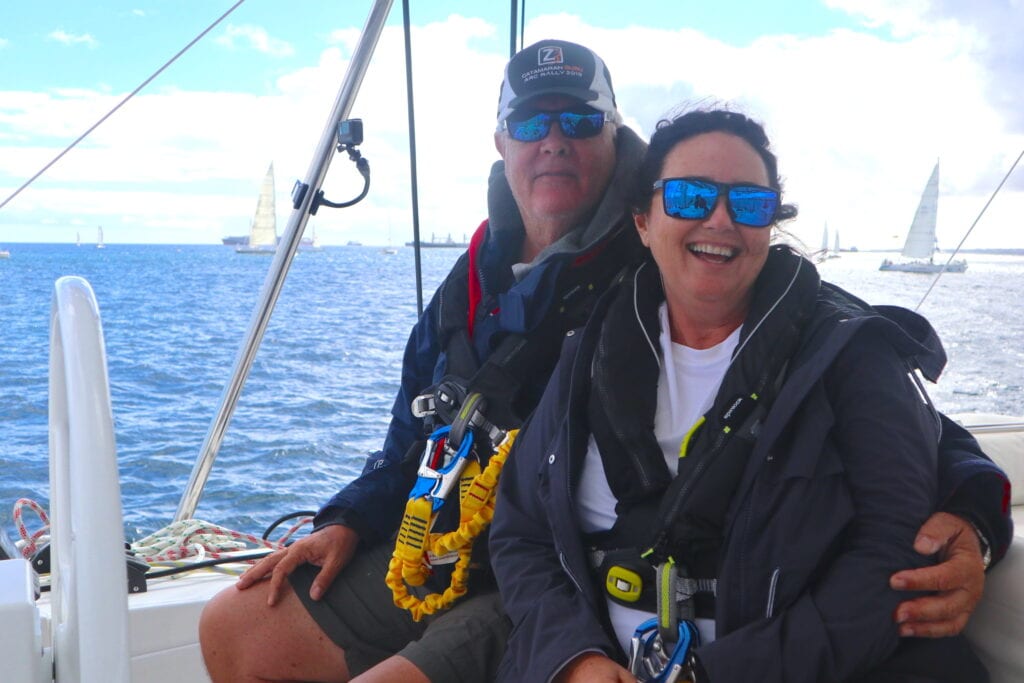
Tides of Change
SBS – How much has the catamaran business evolved over the years, and what do you think about its future?
Stephen – Well, in the nineties, I wouldn’t even put a foot on a catamaran.
SBS – Why?
Stephen – Because the perception was that it’s dangerous and doesn’t sail well. However, catamarans have evolved to where they sail very well today. The performance catamarans are faster and sail better than most monohulls today. The design has evolved tremendously for performance, but not only for that. Interior comfort, size, sleeping, eating, accommodation, and salon have all evolved to become far more efficient. Regarding the evolution, I think the catamaran book is still being written. In our market, monohulls have become a second string to catamarans. Everyone now recognizes that catamarans are the most comfortable and are the other vessel of choice. Also, remember that the construction methods have improved. Technology has moved the catamaran up to where it is today. I think it’s the fastest-growing sector by percentage in the entire industry.
Knowledge is Wind in Your Sails
SBS – Do you think education is important, not just regarding boats, but also knowing how to sail? Are there people who want to buy a boat and learn everything on their own?
Estelle – There are certainly people who do that, and you’ll see it a lot on YouTube — younger people hop on the boat, and there they go. It’s not the recommended method, however. In our experience, when sailing is great, it is fantastic (the smooth seas, a beautiful little breeze, and everything is great). When things go wrong and you have bad weather, you have to know how to sail, how to handle yourself in an emergency, know the emergency drills, etc. Your engines might stop working, and if you don’t know how to troubleshoot that, it’s very, very tough. So, education comes first! What do you think, Stephen?
Stephen – Yeah, most people want to be educated. If you do sailing courses and get educated, much of what you’re doing becomes clearer. You understand why you’re doing it and where it evolves from. But again, everyone’s different. We find that many people, even those who have bought boats from us, have never sailed. It’s crazy. There are also people with this dream who can afford it. Just this week, we have people to whom we sold a big boat coming to our sailing school, and they’re going to do a week of sailing sail training on their education, which is a very important aspect.
Casting the Net: Key Marketing Strategies
SBS – I assume that people recommend you to others because of everything you have done in the past. But do you have any other marketing strategies to attract new clients?
Estelle – Word of mouth is one of our strongest testimonials, but we use social marketing extensively. YouTube is huge for everybody, and we make many educational and sailing training videos. We don’t have a marketing budget as such, but I do spend quite a bit of money on our social media marketing.
Stephen – We’ve been fortunate enough to acquire dealerships for different brands. We have the Catana dealership and the BALI dealership. These are mainstream brands and are among the top four manufacturers in the world. These dealerships we’ve acquired are very good for us as well because we are now recognized as dealers, and with that, you have another whole web of people and a net of social media.
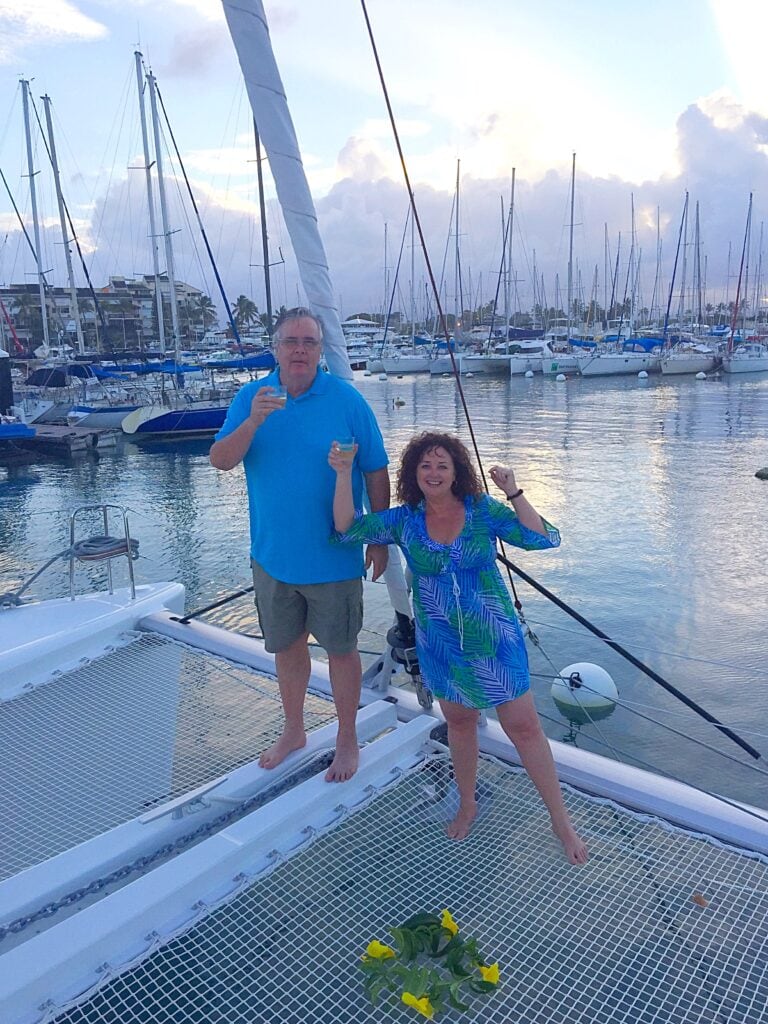
Balancing on the Deck: Managing Business and Travel
SBS – How do you balance your traveling lifestyle with running a business? Is it difficult, or are you used to it?
Estelle – Well, if you look at the beautiful blue water in the Bahamas, all you want to do is go out and swim or dive. We set aside a few hours every day to do that. We have Starlink on board. Technology has completely set us free. We don’t have to be in an office. We can be on our boat in the Bahamas and do a day’s work just like anybody else in an office.
Stephen – The only brick-and-mortar we really need are the dealerships, so the brick-and-mortar requirement is becoming less and less, and the business is becoming pretty portable. Starlink set us free because now we have high-speed internet anywhere we are, and we can run the business remotely.
Estelle – We sold boats crossing the ocean from the Canaries to the Caribbean. So it’s become that easy, honestly.
Clearing the Fog: Debunking Misconceptions
SBS – What is the biggest misconception people have about the yacht business and everything you do?
Stephen – A misconception is that it’s easy. It’s not. There’s so much to it; it’s a very complicated business. People look at it and think it’s a yacht, so it must be easy. It’s not easy. You’ve really got to pay attention, and you’ve got to have a very good grasp on issues. That’s why I go back to what I said — if you want to get into it, find your bandwidth, focus on that, and become an expert there before you expand outwards.
Estelle – People look at our social media and see we’re here today, somewhere else tomorrow, and at a new exotic place next month, and they want our lifestyle. Well, yes, it’s fantastic, and we love it, but you don’t see how hard we work behind the scenes.
Stephen – I always tell people it takes 20 years in a business to start making money.
Subscribe to Our Newsletter
and gain insider access to cutting-edge business insights and trends.
Featured Resources
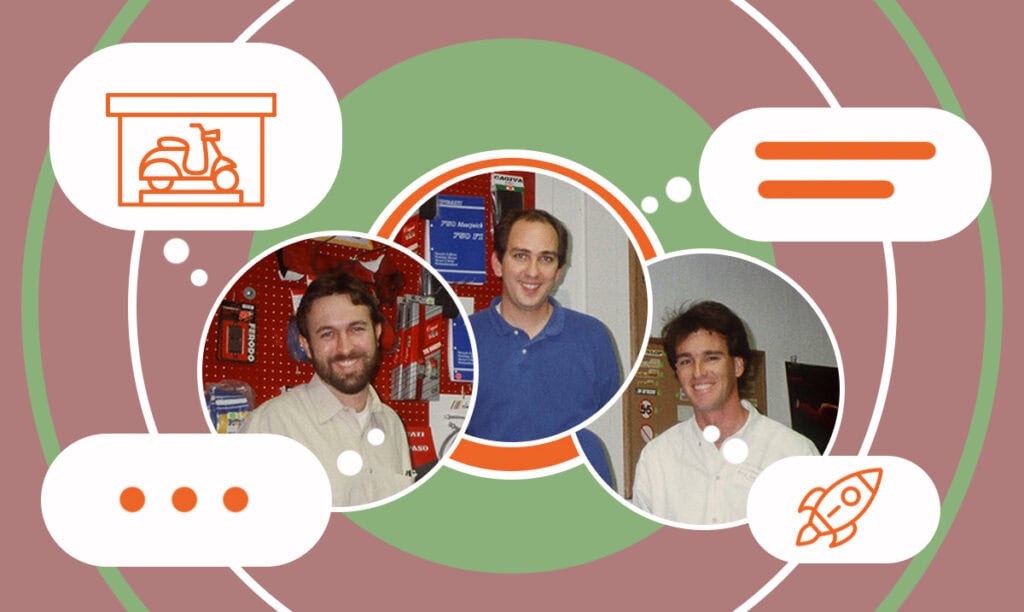
How Pro Italia Pioneers Success in the Motorcycle Industry
Published on May 29, 2024
Read Now

Unpacking Success with OneShotMove’s Alexander Shvetz
Published on January 23, 2024
In this interview, we sit down with Alexander Shvetz, the owner of OneShotMove. This Los Angeles-based company has carved a niche in the movingindus ...
Read Now
Comments